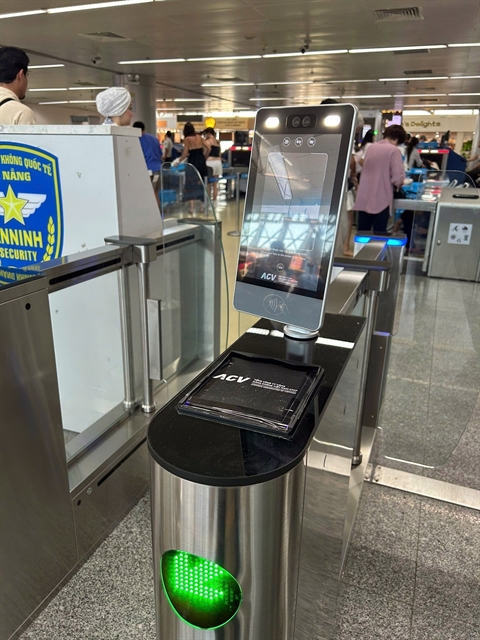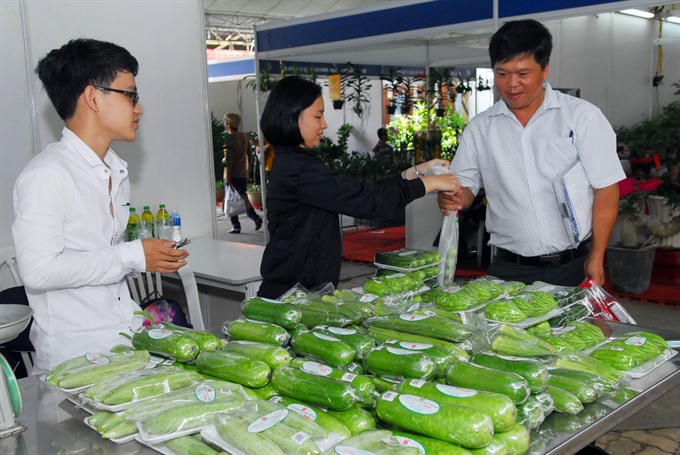 Economy
Economy

Thanks to the Ministry of Agriculture and Rural Development (MARD)’s drastic and direct administrative reform, a majority of cumbersome business and investment conditions (permits) have been significantly omitted for agricultural producers, reducing cost and boosting productivity in the process.
 |
| Agricultural products on display at an annual farmers’ market in Củ Chi District, HCM City. — VNA/VNS Photo Mạnh Linh |
HÀ NỘI — By putting the satisfaction of businesses at the heart of its admin reform efforts, the Ministry of Agriculture and Rural Development (MARD) has been able to remove many cumbersome procedures, helping reduce production costs and boost productivity, experts said at an online discussion on December 19.
Nguyễn Thị Kim Anh, director of the agricultural ministry’s Legislation Department, said that in August 2017, the ministry had established a one-stop agency dedicated to streamlining administrative procedures.
It has proposed that 118 business permits are amended – 53 simplified and 65 elemin, out of a total 345 business and investment permits by the year’s end, Anh said.
One department will single-handedly accept, classify, and then transfer firms’ submitted dossiers to each corresponding unit under the ministry. This procedure is publicised by MARD in the form of a national database online portal on the ministry’s public service system, Anh added.
Nguyễn Trọng Ái, deputy head of the Plant Protection Department (PPD) under the MARD, said that agricultural firms no longer need to visit official administrative departments to get the job done, his office included.
At present, the ministry has developed 18 online public services and 11 one-stop admin procedures, helping businesses save time and money, Ái said.
He said the ministry has been reviewing a simplification proposal for 18 of 40 specialised inspection procedures, opting for unified food safety and quarantine testing and fusing two procedures of quarantine registration and declaration.
It is also simplifying pre-test procedures, reasonably reducing the number of sampling and testing, and accepting test results from the exporting country.
Anh said that inspections of exported seafood shipments have been shortened from five to seven working days and to eight hours per consignment, while quarantine and clearance time has been shortened from 24 hours to no more than four hours for goods transported by land or air and no more than 10 hours for those transported by sea.
In the near future, the agriculture ministry will remove another fee for granting animal quarantine certificates, saving businesses about VNĐ9.5 billion (US$423,000) annually.
Nguyễn Xuân Dương, deputy director of the ministry’s Livestock Production Department, said that many southern enterprises in the livestock sector had to travel to Hà Nội to complete the necessary administrative procedures.
Before the ministry’s online public systems became operational, firms tried to cut their costs by hiring middlemen to handle the red tape, he said.
Dương said that the application of one-stop administrative process has significantly reduced between 60 to 70 per cent of goods inspection and clearance time and saved hundreds of thousands of dollars for businesses.
On behalf of the PPD, Ái stated that since the Law on Plant Protection and Quarantine has been enforced, his department has reviewed and amended 27 administrative procedures; reducing the number from 66 to 39 of current administrative procedures.
In the coming time, the department is proposing the abolishment or modification of 118 business permits.
The ministry also intends to further accelerate administrative procedures reforms, working directly with enterprises to understand better their difficulties and ensure transparency and objectivity, he said.
Towards this, ministry will review all the documents to cut overlap, reduce cumbersome administrative procedures and create a favourable environment for enterprises, deploying technical barriers to protect domestic agricultural production, and prevent poor quality imports.
Dương admitted that there were problems to deal with, including missing database and lack of information infrastructure. Despite clear legal documents, businesses have reported regular network problems with the online public services.
Many officials are loath to change the old practice of habits of reading printed records. Therefore, changing these cadres’ perception was a very important task,’ he added.
Ái also pointed out that applying new administrative procedures can be difficult and time consuming at first, but the gears can be switched soon. — VNS